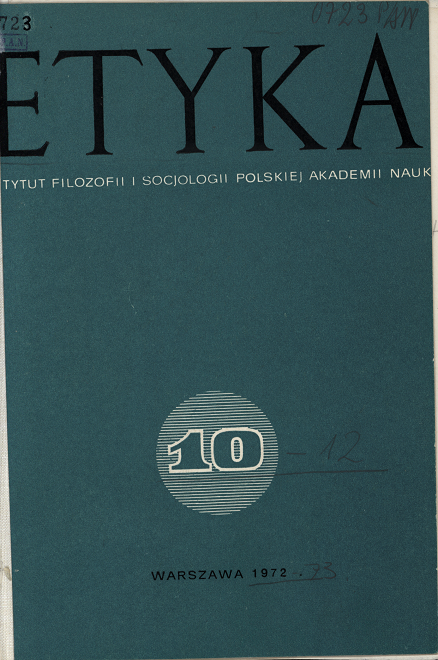Morality and politics
DOI:
https://doi.org/10.14394/etyka.1294Abstract
A conference devoted to the relationship between morality and politics was held on May 21, 1971, on the initiative of the Editors of "Etyka". Representatives of various specializations within the social sciences participated. The discussion was opened and summed up by J. J. Wiatr.
J. J. Wiatr proposed to transfer T. Kotarbiński's principle of reliable guardianship to the field of poiitics. In this new application the principle defines the morally right conduct to be that which assures protection to all who are entitled to expect it. Political power is a moral duty, and thus it is subject to moral appraisal. Directly ensuing from the principle of reliable guardianship is the principe de l'engagement, and a duty to act competently. In politics, the application of the reliable guardianshiip principle is confined to one chosen community. Marxism defines this community in terms of class struggle theory. Allegiance to one's class is not, however, identical with absolute loyality to it. Its limiits are set by the framework of ultimate moral norms, and the belief that the highiest moral value is the human being. There are, therefore, morał norms that must not be broken even in the course of struggle for the right cause.
In the ensuing discussion two views came to be voiced:
1. Politics is subject to moral assessment from the standpoint of certain moral principles and ideals.
2. Politics is not subject to moral assessment. In class-split societies moral ideals are subordinate to politics. Indeed, in Marx's writings politics is subjected to some sort of moral assessment, said J. Ładosz, but Marx had only one thing in mind,
namely, to demonsitrate the mission of the workers' class, their mission to abolish the class rule in all its forms, which in effect meant abolishing politics. In a classless society there is no room for politics. Consequently, attempts revive politics
are attempts to restore a class-split sooiety, and will be condemned by the communist morality. As long as classes continue to exist, as long as the workers' class - even where it has been victorious - has to take recourse to politics, conflicts between politics and morality are inescapable. This is also true of socialist morality and politics. There is no way of morally elevating politics but through abolishing it altogether.
Most participants in the discussion sided with the former position even though they could not come to agreement as to the choice of moral criiteria for evaluating political actlivities. The following criteria were tentatively formulated: 1) the principle of reliable guardianship combined with certain other ultimaite moral principles (J. J. Wiatr), 2) rules of good social relations (Z. Ziembiński), 3) ultimate moral principles (M. Fritzhand, H. Jankowski, R. Jezierski).
The position expressed by J. J. Wiatr has been challenged by pointing out that the reliable guardianship principle presupposes a fundamental inequality of those who govern and those who are governed (Z. Ziembiński, W. Lang, J. Strzelecki), causing thereby more probłems than it solves. It was also argued that by taking recourse to !the reliable guardianship principle one can justify such evidently wrong acts as, for example; Hitler's annexation of Czechoslovakia (A. Glińska).
The suggestion to evaluate poUtios by applying principles of rules of good social relations has been questioned by saying that it is abstract and ahistoric (J. Ładosz, W. Lang, M. Fritzhand). J. Ładosz argued that ultimate moral principles are not devoid of class character. M. Fritzhand warned against attributing absolute validity to moral norms by pointing out that ithey are incompatible and insufficient to deal with complicated political relations.
The proposition expressed by J. Ładosz was criticised both for its incoherence and for iits involving the danger of moral relativism (H. Jankowski). It was also called abstract and dogmatic. In traditional class conflicts, said J. Strzelecki, moral ideals have been analysed in order to reveal their class character, which was manifested in their having contributive or destructive functions in maintaining class differentiations. It was a truly moralisitic approach, since the assessments obtained hold in the community of the equal. They were not an expression of abstract conservative universalism that focuses its attention on the love-they-neighbour principle.
The discussion has also covered several particular problems. The greatest interest was aroused by the queststion of moral responsibility and political involvement of the scholars. Those who using the authority of their art or science to sanction morally vicious political decisions were strongly reprimanded. It is not only a scholar's right but also his duty, the particlpants argued, to criticize political authority. But he must also be prepared, they added, to share responsibility for political activities aimed at the welfare of his state and nation (J. J. Wiatr).
Two kinds of answers were proposed to account for the controversy between politics and morality. On the one hand, it was held, that their incompabillty is
essentialy inescapable (M. Ossowska), and on the other, it was suggested, that only a communistic socdety will be capable of overercoming the presently observed discord (M. Fritzhand, H. Jankowski, J. Ładosz and others). With particular emphasis it was stressed that relations within society should be transformed so as to minimize the possibility of the occurrence politics vs. morality conflicts, and that ethics should have an important role in bringing to light all the misuses of moral argumentation in support of political activities.
Downloads
Downloads
Published
How to Cite
Issue
Section
License
Works published in ETYKA are available under the Creative Commons Attribution 4.0 International Licence (CC BY 4.0), which entails acknowledgement of authorship. Under this licence, Authors keep their copyrights and agree that their works can be used again legally for any purpose, including commercial ones, without the need to obtain previous consent of the Author or publisher. The articles can be downloaded, printed, copied and disseminated; under the condition that the authorship is indicated accordingly, together with the place of original publication. The Authors preserve their copyrights to the above-mentioned works without any limitation whatsoever.



